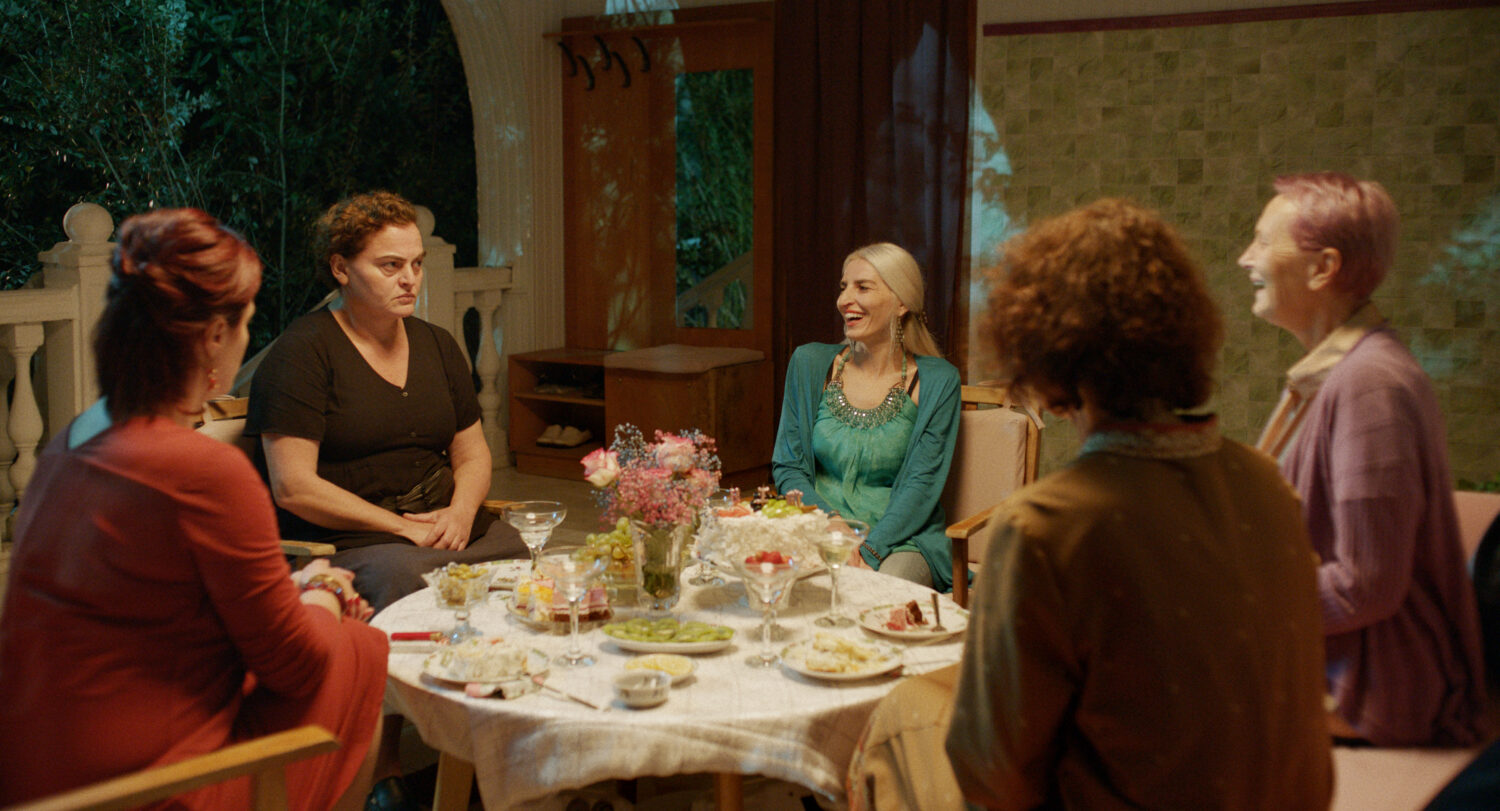‘Blackbird Blackbird Blackberry’ Review: A Lustrous Portrait of Solitude and Desire
By Rida BilgramiIn the opening minutes of Blackbird Blackbird Blackberry, the third feature film from director Elene Naveriani, we meet Etero (Eka Chavleishvili), an austere store owner in a remote village in Georgia, picking blackberries in the wild. She is about to bite into a blackberry when she sees a blackbird. While she is admiring the bird, the rocks beneath her give way. She plunges down the side of a ravine, narrowly saving herself from falling into the river below. Once she rescues herself, she is jolted by the vision of washing up dead on the shore, her corpse surrounded by indifferent neighbours. The near-death experience invigorates a latent desire within her – as Jonathan Franzen put it in an essay last year, “a desire to say yes to the world, a yes to being alive in it.” Minutes later she returns to the beauty supply shop she runs and succeeds in seducing delivery man, Murman (Temiko Chichinadze). “There you go. 48 years of virginity,” she muses to herself.
Naveriani’s film has loosely adapted the 2020 novel by Georgian writer and activist Tamta Melashvili – a work written in first person narrative with Etero in monologue with herself. The screenplay retains the contemplative tone and Chavleishvili’s expressions, gaze, and physicality lend both richness and tenderness to Etero’s interiority and habituated solitude. She lives alone and has done so for many years, if not decades, cultivating a life of contentment after the emotional turmoil of a difficult childhood. Her demeanour is aloof and mildly agitated in the presence of other women in the village who pity her unmarried and child-free existence, mocking her ageing body – one that doesn’t conform to prevailing beauty standards. But Etero softens in the moments when she gives herself permission to glisten in the passion of a gentle romance, and when she marvels at the beauty of the natural world. She goes for long walks in the forest, picking wild blackberries and transforming them into preserves at home. She enjoys taking the bus to the nearest town and enjoying a coffee and pastry at a local café. In one of the most powerful scenes Etero self-assuredly remarks back to another customer who comments about her weight and marriage prospects: “If marriage and dicks brought happiness, many women would be happy.” She then proceeds to fold a huge slice of millefeuille into her mouth and asks the server to pack her four more: a stunning reminder, too, of how rare and refreshing it is to see on-screen depictions of women in middle age eating in public on their own, savouring each moment and tending to their appetite for pleasure.

Blackbird Blackbird Blackberry has been compared to Finnish auteur Aki Kaurismäki’s Fallen Leaves, which centres on two working-class protagonists in Helsinki who experience a blooming of love and intimacy later in life. In my view, Blackbird Blackbird Blackberry shares a similar sensibility and outlook to one of my favourite films this year – Wim Wender’s Perfect Days, set in Tokyo. Hirayama, the protagonist, is a public toilet cleaner who revels in his solitary life, moving through his day with a meticulous sense of routine, which somehow doesn’t feel rigid. He has left behind a life of privilege and built a life of contentment – embracing the quotidian joys of watering his plants, reading novels, listening to Patti Smith and The Velvet Underground on cassette, and photographing trees. Both Etero and Hirayama are sort of kindred spirits who, far from having an existential crisis in middle age, have learned not to mistake conformity for belonging. Their ability to see wonder in the minutiae of their lives without needing to leave the environments they inhabit feels subversive in a maximalist world. The rhythms of their lives may initially strike the viewer as routine but the more time you spend with these characters, the more you admire their grace, hard-won independence and agency.
Naveriani, like Wenders, studied to become a painter before moving into direction and screenwriting: a fact visible in the spare, luminous quality of an Edward Hopper painting in several interior scenes. The soundscape also evokes a sense of stillness and charts the transformation in Etero: Particularly in the first half of the film, the birdsong, the murmur of rain, the clamour of the river summon us into the world of Etero, coexisting with nature. As she pursues romance, music enters her world.
In a conversation with MUBI, Naveriani says she sees Etero as an instinctive feminist: Her feminism is not ideologically motivated, it is intrinsic to her way of being. The film is an invitation to consider that feminist resistance takes many forms – often it is quiet and tender. It can be the shape of a woman, who despite being consistently told she is not desirable, chooses to honour and articulate her own desires both within and outside of romantic love. By not conforming to a life shaped by societal scripts she ruptures the heteronormative standards of the micro society she has inhabited all her life. The subtlety and richness in both the writing and the acting ensures this film transcends one woman on the cusp of 50 finding renewal and purpose in a romantic relationship. This is a textured portrait of someone returning back to herself, both spiritually and sensually, exploring her relationship to her own body, and her sense of belonging in the world. This spirit of discovery and expansiveness is best exemplified in the small details. There is a beautiful scene in which Etero and Murman are driving through the countryside sharing a romantic journey. She gazes out of the window, the trees move out of the way, and she sees a much wider world – one of abundant possibilities.

Recommended reading
I can’t think of a more relevant companion piece to this book than Amy Key’s memoir Arrangements in Blue: Notes on Loving and Living Alone. A poignant and lyrical examination of a solitary life lived well. The author takes Joni Mitchell’s seminal album Blue – which shaped Key’s understanding of love and longing – as a lens, to explore building a home of one’s own, the myriad forms of intimacy that nourish us, and the beauty of befriending ourselves.
Desperately Seeking Shahrukh: India’s Lonely Young Women and the Search for Intimacy and Independence by Shrayana Bhattacharya. A bracingly original book on the public and private revolutions women in post-liberalisation India are having, which echoes in many other societies with strict patriarchal codes, including in Georgia.
Still Born by Guadalupe Nettel (translated from Spanish by Rosalind Harvey) explores the lives of two friends with ambivalent feelings about motherhood. While friendship is a central theme in this novel, it offers a sharp commentary on patriarchal ideas of motherhood and maternal instinct.
Rida Bilgrami is a writer based in London. Her work spans poetry, essays and reported features with a focus on travel, books, visual culture and cities. Header image courtesy of Takes Film.